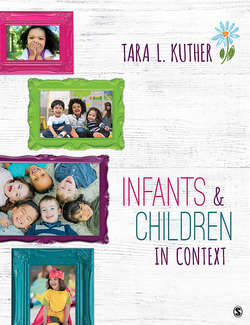Читать книгу Infants and Children in Context - Tara L. Kuther - Страница 47
На сайте Литреса книга снята с продажи.
Erikson’s Psychosocial Theory
ОглавлениеErik Erikson (1902–1994) was influenced by Freud, but he placed less emphasis on unconscious motivators of development and instead focused on the role of the social world, society, and culture. According to Erikson, throughout their lives, individuals progress through eight psychosocial stages that include changes in how they understand and interact with others, as well as changes in how they understand themselves and their roles as members of society (Erikson, 1950) (see Table 1.1 for a comparison of Freud’s and Erikson’s theories). Each stage presents a unique developmental task, which Erikson referred to as a crisis or conflict that must be resolved. How well individuals address the crisis determines their ability to deal with the demands made by the next stage of development. For example, children’s success in achieving a sense of trust in others influences their progress in developing a sense of autonomy, the ability to be independent and guide their own behavior. Regardless of their success in resolving a crisis of a given stage, individuals are driven by biological maturation and social expectations to the next psychosocial stage. No crisis is ever fully resolved, and unresolved crises are revisited throughout life.
Erik Erikson (1902–1994) posited that throughout their lifetime, people progress through eight stages of psychosocial development.
Ted Streshinsky Photographic Archive/Corbis Historical/Getty Images
Table 1.1
As one of the first lifespan views of development, Erikson’s psychosocial theory views development as spanning well beyond childhood. Erikson’s theory offers a positive view of development and includes the role of society and culture, largely ignored by Freud. In addition, Erikson based his theory on a broad range of cases, including larger and more diverse samples of people than did Freud. Largely viewed as unfalsifiable, Erikson’s theory is criticized as difficult to test. Yet it has nonetheless sparked research on specific stages, most notably on the development of identity during adolescence and the drive to guide youth and contribute to the next generation during middle adulthood (Crain, 2016). Erikson’s ideas can help us understand children’s socioemotional development. We will revisit his theory throughout this book.
